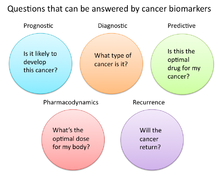
A cancer biomarker refers to a substance or process that is indicative of the presence of cancer in the body. A biomarker may be a molecule secreted by a tumor or a specific response of the body to the presence of cancer. Genetic,[1] epigenetic,[2] proteomic,[3] glycomic,[4] and imaging biomarkers can be used for cancer diagnosis, prognosis, and epidemiology. Ideally, such biomarkers can be assayed in non-invasively collected biofluids like blood or serum.[5]

While numerous challenges exist in translating biomarker research into the clinical space; a number of gene and protein based biomarkers have already been used at some point in patient care; including, AFP (liver cancer), BCR-ABL (chronic myeloid leukemia), BRCA1 / BRCA2 (breast/ovarian cancer), BRAF V600E (melanoma/colorectal cancer), CA-125 (ovarian cancer), CA19.9 (pancreatic cancer), CEA (colorectal cancer), EGFR (Non-small-cell lung carcinoma), HER-2 (Breast Cancer), KIT (gastrointestinal stromal tumor), PSA (prostate specific antigen) (prostate cancer), S100 (melanoma), and many others.[6][7][8][9][10][11][12][13][14][15] Mutant proteins themselves detected by selected reaction monitoring (SRM) have been reported to be the most specific biomarkers for cancers because they can only come from an existing tumor.[16] About 40% of cancers can be cured if detected early through examinations.[17]
- ^ Calzone KA (May 2012). "Genetic biomarkers of cancer risk". Seminars in Oncology Nursing. 28 (2): 122–128. doi:10.1016/j.soncn.2012.03.007. PMC 10433658. PMID 22542320.
- ^ Herceg Z, Hainaut P (June 2007). "Genetic and epigenetic alterations as biomarkers for cancer detection, diagnosis and prognosis". Molecular Oncology. 1 (1): 26–41. doi:10.1016/j.molonc.2007.01.004. PMC 5543860. PMID 19383285.
- ^ Li D, Chan DW (April 2014). "Proteomic cancer biomarkers from discovery to approval: it's worth the effort". Expert Review of Proteomics. 11 (2): 135–136. doi:10.1586/14789450.2014.897614. PMC 4079106. PMID 24646122.
- ^ Aizpurua-Olaizola O, Toraño JS, Falcon-Perez JM, Williams C, Reichardt N, Boons GJ (2018). "Mass spectrometry for glycan biomarker discovery". TrAC Trends in Analytical Chemistry. 100: 7–14. doi:10.1016/j.trac.2017.12.015.
- ^ Mishra A, Verma M (March 2010). "Cancer biomarkers: are we ready for the prime time?". Cancers. 2 (1): 190–208. doi:10.3390/cancers2010190. PMC 3827599. PMID 24281040.
- ^ Rhea J, Molinaro RJ (March 2011). "Cancer Biomarkers: Surviving the journey from bench to bedside". Medical Laboratory Observer. Archived from the original on 14 October 2013. Retrieved 26 April 2013.
- ^ Behne T, Copur MS (1 January 2012). "Biomarkers for hepatocellular carcinoma". International Journal of Hepatology. 2012: 859076. doi:10.1155/2012/859076. PMC 3357951. PMID 22655201.
- ^ Musolino A, Bella MA, Bortesi B, Michiara M, Naldi N, Zanelli P, et al. (June 2007). "BRCA mutations, molecular markers, and clinical variables in early-onset breast cancer: a population-based study". Breast. 16 (3): 280–292. doi:10.1016/j.breast.2006.12.003. hdl:11381/1629553. PMID 17257844.
- ^ Dienstmann R, Tabernero J (March 2011). "BRAF as a target for cancer therapy". Anti-Cancer Agents in Medicinal Chemistry. 11 (3): 285–295. doi:10.2174/187152011795347469. PMID 21426297.
- ^ Lamparella N, Barochia A, Almokadem S (2013). "Impact of Genetic Markers on Treatment of Non-small Cell Lung Cancer". Impact of Genetic Targets on Cancer Therapy. Advances in Experimental Medicine and Biology. Vol. 779. pp. 145–164. doi:10.1007/978-1-4614-6176-0_6. ISBN 978-1-4614-6175-3. PMID 23288638.
- ^ Orphanos G, Kountourakis P (2012). "Targeting the HER2 receptor in metastatic breast cancer". Hematology/Oncology and Stem Cell Therapy. 5 (3): 127–137. doi:10.5144/1658-3876.2012.127. PMID 23095788.
- ^ Deprimo SE, Huang X, Blackstein ME, Garrett CR, Harmon CS, Schöffski P, et al. (September 2009). "Circulating levels of soluble KIT serve as a biomarker for clinical outcome in gastrointestinal stromal tumor patients receiving sunitinib following imatinib failure". Clinical Cancer Research. 15 (18): 5869–5877. doi:10.1158/1078-0432.CCR-08-2480. PMC 3500590. PMID 19737953.
- ^ Bantis A, Grammaticos P (Sep–Dec 2012). "Prostatic specific antigen and bone scan in the diagnosis and follow-up of prostate cancer. Can diagnostic significance of PSA be increased?". Hellenic Journal of Nuclear Medicine. 15 (3): 241–246. PMID 23227460.
- ^ Kruijff S, Hoekstra HJ (April 2012). "The current status of S-100B as a biomarker in melanoma". European Journal of Surgical Oncology. 38 (4): 281–285. doi:10.1016/j.ejso.2011.12.005. PMID 22240030.
- ^ Ludwig JA, Weinstein JN (November 2005). "Biomarkers in cancer staging, prognosis and treatment selection". Nature Reviews. Cancer. 5 (11): 845–856. doi:10.1038/nrc1739. PMID 16239904. S2CID 25540232.
- ^ Wang Q, Chaerkady R, Wu J, Hwang HJ, Papadopoulos N, Kopelovich L, et al. (February 2011). "Mutant proteins as cancer-specific biomarkers". Proceedings of the National Academy of Sciences of the United States of America. 108 (6): 2444–2449. Bibcode:2011PNAS..108.2444W. doi:10.1073/pnas.1019203108. PMC 3038743. PMID 21248225.
- ^ Li X, Ye M, Zhang W, Tan D, Jaffrezic-Renault N, Yang X, Guo Z (February 2019). "Liquid biopsy of circulating tumor DNA and biosensor applications". Biosensors & Bioelectronics. 126: 596–607. doi:10.1016/j.bios.2018.11.037. PMID 30502682. S2CID 56479882.